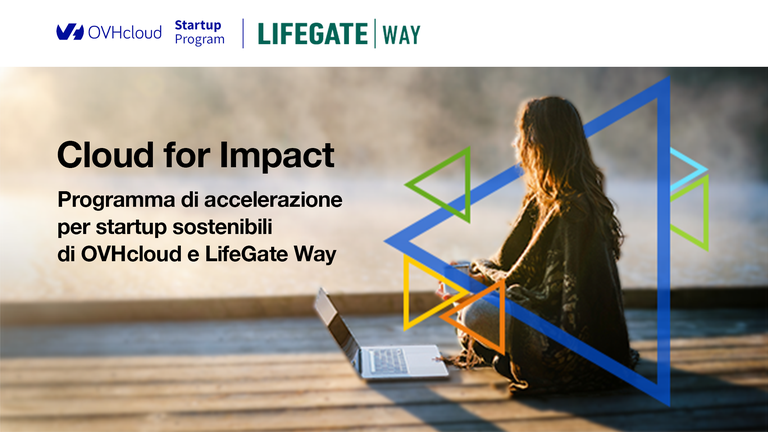https://www.lifegate.it/ovhcloud-cloud-startup
- |
Six out of ten Italian companies have adopted the platforms cloud:this means that, instead of building and managing a proprietary IT architecture, they rely on platforms made available online by providers.With indisputable advantages in terms of flexibility, ability to collaborate remotely, stability and cost containment:advantages that can make the difference especially for younger companies with high innovative potential.The startups, In short.It was also born as a startup OVHcloud, a French company that set itself some very clear objectives right from the start:guarantee high performance to customers, and do so while minimizing the environmental impact of structures which in themselves are extremely energy-intensive.

The challenge of OVHcloud, the first French unicorn
Founded in 1999 in Roubaix, OVHcloud it was the first transalpine startup to boast the coveted title of unicorn, reaching a valuation of one billion dollars.Today it is the largest web hosting company in the European Union, with over 400 thousand servers in its 33 data centers located on four continents.One of the innovations, compared to competitors, lies in the choice to face head-on the crucial issue for the future of these technologies:the enormous environmental impact associated with data centers, the "engine rooms" that house the IT equipment.
The strategies adopted are heterogeneous.For example, some data centers have been built by redeveloping existing buildings, such as an old German hydroelectric power plant.In 2003 the first water cooling system made its debut (watercooling):a very small quantity of water is enough to prevent the machines from overheating, with much greater efficiency than obsolete air systems.Already today the 78 percent of energy needs is satisfied by renewable sources, but the aim is for 100 percent by 2025.And, when a server physiologically ages and no longer guarantees the high performance for which it was designed, it is not dismantled but rather reused in contexts in which it can still be useful.
Our interview with Jonathan Clarke
To go into more detail on the value of the cloud for innovative startups, and on the programs launched by OVHcloud itself to support them, we reached Jonathan Bowman Clarke, Start-Up Program Leader – Southern Europe of OVHcloud.
How does the cloud boost the competitiveness of startups?
Let's start with a premise:what is the cloud?Any information that is on a network is supported by machines that we call servers.Twenty years ago you had to buy these servers and manage them in-house.Since becoming virtualized, many more people have been able to access digital products.
And what is a startup? There are many definitions:in my opinion, a startup is a company that has an uncertain, but also scalable and potentially exponential business model.This scalability is also thanks to technology.The cloud allows them to be more scalable, more flexible and focus on the product, because the cloud manager takes care of the server maintenance.
There is also the price factor.The cloud has changed the payment formulas for these technological means:Previously they were purchased, now you can only use the spaces and functions you need.This cost optimization linked to migration to the cloud can also be measured using a metric called total cost of ownership (Tco).

The flexibility of the cloud will prove crucial with the mass adoption of the smart working…
When the pandemic broke out, in the space of a few months companies made progress in terms of digital transformation, which in other contexts would have taken years.However, this is especially true for more traditional businesses.Startups are digital natives and start directly with the cloud:perhaps when Covid-19 arrived they were already hybrid and remote, but they took advantage of this to adopt new technologies.
In 2015 you launched theOVHcloud Startup Program.What is it about?
This program started in 2015, at the time it was called Digital Launch Pad.The initial idea was to give support to young companies, which face so many risks and uncertainty, and help them embark on the path that OVHcloud itself has taken, being the first French unicorn.In 2020 the program grew and became even more international, also thanks to the dialogue with various local interlocutors.
It is a 12-month, always active program that offers startups and scaleups three main benefits:technology, visibility and ecosystem.As for technology, we provide them with credits to spend on cloud solutions and personalized technical support.In terms of visibility, we include them in our community and organize events and contests in which they can participate.Finally, we integrate them into a partner ecosystem:consultants, legal experts, incubators, investors.From 2015 to today, 2,600 startups have joined this program.
How has the OVHcloud Startup Program been received in Italy?
Two years ago three startups were part of it, today there are 35.Last year we organized an international pitch contest and an Italian startup won, Mapo Tapo, which organizes climbing trips and was incubated by B4i, which is part of Bocconi University.
Success lies not only in startups but also in the ecosystem:in Italy we have fifteen partners, including the coworking space White dwarf in Florence, B4i itself, and also LifeGate Way, with which we immediately thought of a program to support sustainable startups.We at OVHcloud have always explained what efforts a cloud provider can make to improve its social and environmental impact;now we have decided to take a step further.
How present is the topic of sustainability among the startups you follow?
This is the first time we have launched a thematic program, and the chosen theme is sustainability.We already follow several startups working in the field of carbon footprint measurement, circular economy and so on, and I hope that more and more will come.For example, this comes to mind Wise Robotics:He is from Rome and uses the internet of things (iot) for structural and seismic monitoring of buildings and infrastructures.There is one that monitors the air quality, another that analyzes satellite data to reconstruct the impact of climate changes on agriculture and indicate improvement solutions.

